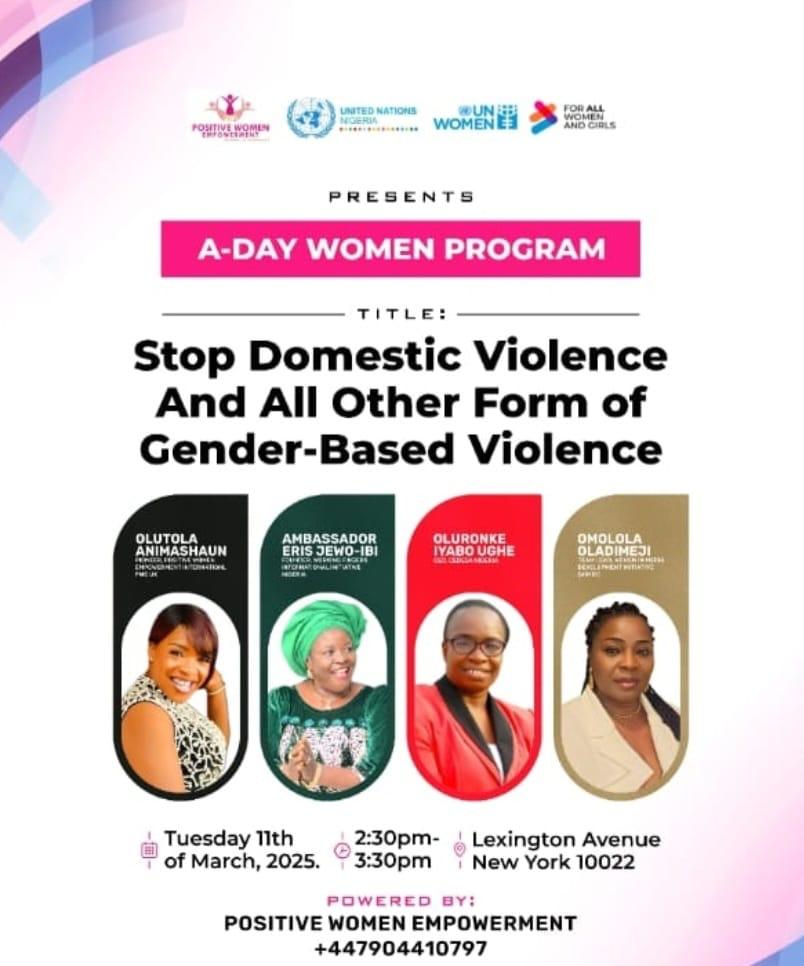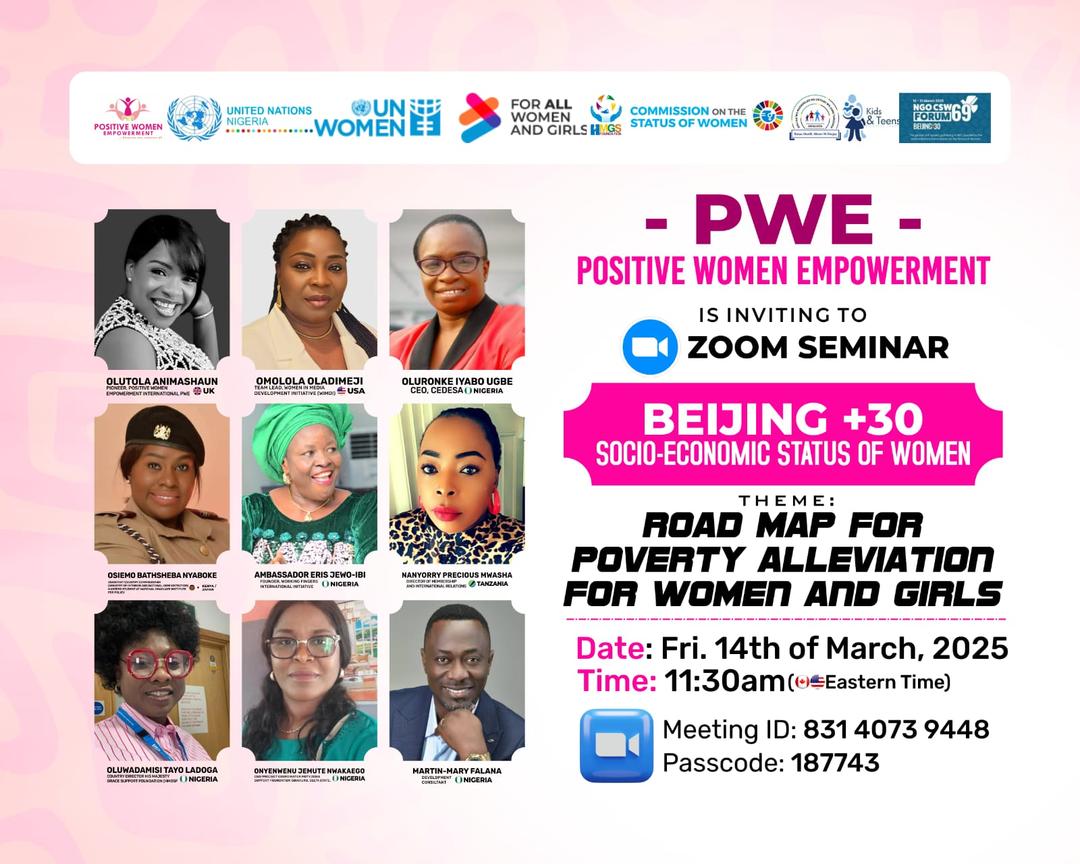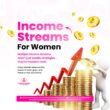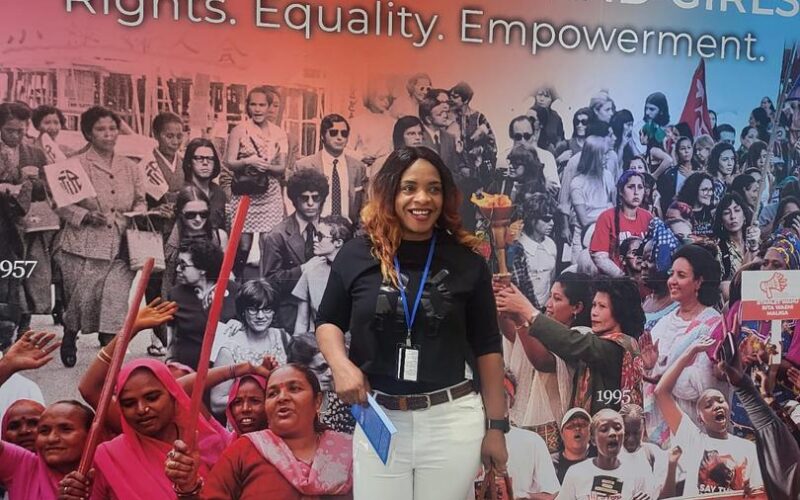In a transformative moment at the 69th session of the Commission on the Status of Women (CSW69) held at the United Nations Headquarters in New York, Olutola Animashaun—an MA-qualified adults social worker dedicated to supporting individuals with their physical and mental well-being needs — addressed key strategies for effectively combating domestic violence and all forms of gender-based violence. As the pioneer and CEO of Positive Women Empowerment, a non-profit organization she has led for nearly two decades, Olutola Animashaun delivered this powerful message: “Investing in women’s future”, which underscores the importance of empowering women through enhanced access to education, particularly in STEM and vocational training, to drive long-term progress and equality.’
The global community recognizes that empowering women and girls is central to achieving the Sustainable Development Goals. A critical pathway to this empowerment lies in ensuring universal access to quality education, encompassing not only foundational learning but also a focused effort on Science, Technology, Engineering, and Mathematics (STEM) and effective vocational education and training (TVET). Enhancing access to these areas is not merely an educational goal; it is a strategic imperative for fostering gender equality, driving economic growth, and building resilient societies worldwide.

Despite progress in increasing female enrollment in education, significant disparities persist globally. Millions of women and girls continue to face formidable barriers that limit their access to and completion of quality learning opportunities. These barriers, often rooted in poverty, cultural norms, gender bias, conflict, and lack of accessible infrastructure, hinder individual potential and impede broader societal advancement.
As underscored in some of the programmes I have organised such as the BEIJING+30: CONCERNS 1&2 event, which addressed Strategies for Effectively Combating Domestic Violence and All Forms of Gender Based Violence, and the BEIJING +30 SOCIO-ECONOMIC STATUS OF WOMEN forum, centered on a Road Map for Poverty Alleviation For Women And Girls, education is a powerful tool for dismantling inequalities and empowering women to overcome systemic challenges. At another of our programmes, The Positive Women Empowerment in conjunction with HMGSF & SMAUJATA on CSW69 FEEDBACK CHAT, Olutola Animashaun stated that an educated woman is better equipped to assert her rights, participate fully in economic and public life, and break free from cycles of poverty and violence.
The Pillars of Quality Education for Women:
Ensuring quality education for women necessitates a holistic approach that goes beyond mere enrollment. It requires:
Relevant and Gender-Responsive Curricula: Learning materials must be free of gender bias, culturally relevant, and designed to equip women and girls with the knowledge and skills needed for the 21st-century workforce and active citizenship.
Skilled and Supportive Educators: Investing in well-trained teachers who are sensitive to gender dynamics and equipped to deliver engaging instruction in STEM and vocational fields is paramount. Ongoing professional development is essential.
Safe and Accessible Learning Environments: Educational institutions must be safe, inclusive, and free from all forms of gender-based violence and discrimination. Accessible infrastructure and resources are crucial for all learners.
Equitable Opportunities and Policies: Addressing systemic barriers such as early marriage, teenage pregnancy, and discriminatory social norms through supportive policies and community engagement is vital to ensure girls and women can access and complete their education.

Unlocking Potential Through STEM Education for Women:
In an increasingly technology-driven world, STEM literacy is no longer a niche area but a fundamental skill for all. Enhancing access to quality STEM education for women and girls offers transformative potential by:
Developing Critical Thinking and Innovation: STEM disciplines cultivate analytical skills, problem-solving abilities, and a mindset of innovation, empowering women to become creators and leaders in technological advancements.
Expanding Career Pathways: STEM fields offer high-growth, well-compensated career opportunities, enabling women to achieve economic independence and contribute to economic diversification.
Addressing Global Challenges: Women’s participation in STEM brings diverse perspectives and innovative solutions to complex global challenges, from climate change to healthcare.
Empowering Women Through Vocational Education and Training (TVET):
Quality TVET programs play a crucial role in equipping women with practical, market-relevant skills that lead to economic empowerment. By enhancing access to effective vocational training, we can:
Bridge Skills Gaps and Increase Employability: TVET programs aligned with industry needs provide women with the specific skills demanded by employers, leading to greater job security and economic opportunity.
Promote Entrepreneurship and Economic Independence: Vocational training can empower women to start their own businesses and become financially self-sufficient, contributing to local economic growth, a key focus of the BEIJING +30 SOCIO-ECONOMIC STATUS OF WOMEN discussions.
Challenge Gendered Labor Market Segregation: Providing women with access to training in traditionally male-dominated trades can break down occupational segregation and create more diverse and equitable workforces.

A Call to Action for UN Nations:
To truly enhance access to quality education, including STEM and vocational training, for all women and girls, the following actions are critical:
Prioritize Investment: Increase national and international investment in education systems, with a specific focus on initiatives that promote girls’ and women’s participation and success in STEM and vocational fields.
Address Gender Barriers: Implement policies and programs that actively address the social, economic, and cultural barriers that prevent women and girls from accessing and completing quality education.
Strengthen Teacher Training: Invest in comprehensive training and professional development for educators in STEM and vocational disciplines, with a focus on gender-responsive pedagogy.
Develop Inclusive and Relevant Curricula: Ensure that curricula are gender-sensitive, engaging, and aligned with the demands of the future workforce. Integrate practical, hands-on learning opportunities in STEM and vocational areas.

Leverage Technology for Access and Quality: Utilize digital learning platforms and resources to expand access to quality education, particularly for women and girls in remote and underserved communities. Ensure digital literacy and affordable access to technology.
Foster Partnerships: Strengthen collaboration between governments, educational institutions, the private sector, civil society organizations, and international bodies to develop and implement effective and sustainable solutions.
Promote Mentorship and Role Models: Support initiatives that connect girls and women with successful female role models in STEM and vocational fields to inspire and guide their educational and career paths.
Collect and Utilize Gender-Disaggregated Data: Improve data collection and analysis to better understand the specific challenges and needs of women and girls in education and to monitor the effectiveness of interventions.
Conclusion
As I have already emphasized through my work, including the significant dialogues held during the BEIJING+30 follow-up events, empowering women through quality education is not just a matter of rights; it is a fundamental prerequisite for achieving a more just, equitable, and sustainable world. By prioritizing and investing in enhancing access to quality education, including STEM and vocational training, for all women and girls, UN nations can unlock their immense potential and build a future where everyone has the opportunity to thrive.
Olutola Animashaun
CEO Positive Women Empowerment Int
Connect with Us!
Facebook – https://www.facebook.com/share/1CwD1kv3nx/
Instagram – https://www.instagram.com/positivewomenempowerment?igsh=N2t4N3AzOTZnMTM2
YouTube – https://youtube.com/@positivewomenempowerment?si=kt6HmlV8OSyZIPe4
Website – https://positivewomenempowerment.org/






